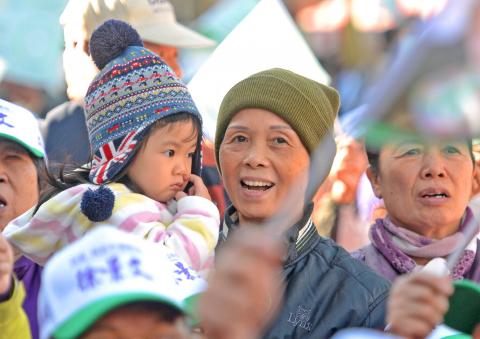Democratic Progressive Party (DPP) presidential candidate Tsai Ing-wen (蔡英文) yesterday called on the Chinese Nationalist Party (KMT) to stop selling its controversial party assets, questioning whether it is doing so to avoid supervision from the next legislature.
“The public should take this seriously. The KMT is trying to sell off its party assets before the legislative and presidential elections,” Tsai said in response to media queries while attending a campaign rally for the party’s legislative candidate in Taoyuan’s Jhongli District (中壢).
“I suspect that [the KMT] is selling the party assets with the intention of avoiding examination and supervision of the new legislature after the election and therefore I call on KMT Chairman Eric Chu (朱立倫) to refrain from selling party assets prior to the election of the new legislature and the passage of legislation on political parties and party assets,” she said.

Photo: CNA
Tsai was referring to advertisements published by the Chinese-language Commercial Times earlier this week that called for buyers for 26 plots owned by the KMT — three in Taipei, six in Taichung and 17 in Changhua — and for 80 percent of the shares of a hotel in Palau.
Tsai asked KMT presidential candidate Chu to clearly explain the funding of his and KMT legislative candidates’ campaigns, as the DPP did.
Chu should explain whether KMT assets have been used to fund election campaigns and how much has been invested so that voters have a basis for comparison between the two parties, Tsai said.
Speaking about the scheduled presidential debates, Tsai said she is glad the three parties have finally reached an agreement on the dates.
The presidential and vice presidential candidates’ debates have been scheduled with the first debate to take place on Saturday next week, the second on Dec. 27 and the third on Jan. 2.
“There will be three debates, and we are happy to have this opportunity to present our policies to voters around the nation,” Tsai said.
Tsai said that her aides would be working closely with debate organizers, while she and her team would be making their final preparations for the debates, adding that she has canceled some public appearances to prepare.
Tsai has been campaigning in Taoyuan and said that the situation is relatively more stable in southern Taiwan, so she would focus on regions where the support is relatively weaker, such as Taoyuan, Hsinchu, Miaoli and New Taipei City.
As for Jhougli, which has traditionally been a stronghold for the KMT, Tsai said that the support for the two parties is 50/50 and called on the voters to give the DPP a chance.

Chinese spouse and influencer Guan Guan’s (關關) residency permit has been revoked for repeatedly posting pro-China videos that threaten national security, the National Immigration Agency confirmed today. Guan Guan has said many controversial statements in her videos posted to Douyin (抖音), including “the red flag will soon be painted all over Taiwan” and “Taiwan is an inseparable part of China,” and expressing hope for expedited reunification. The agency last year received multiple reports alleging that Guan Guan had advocated for armed reunification. After verifying the reports, the agency last month issued a notice requiring her to appear and explain her actions. Guan

GIVE AND TAKE: Blood demand continues to rise each year, while fewer young donors are available due to the nation’s falling birthrate, a doctor said Blood donors can redeem points earned from donations to obtain limited edition Formosan black bear travel mugs, the Kaohsiung Blood Center said yesterday, as it announced a goal of stocking 20,000 units of blood prior to the Lunar New Year. The last month of the lunar year is National Blood Donation Month, when local centers seek to stockpile blood for use during the Lunar New Year holiday. The blood demand in southern Taiwan — including Tainan and Kaohsiung, as well as Chiayi, Pingtung, Penghu and Taitung counties — is about 2,000 units per day, the center said. The donation campaign aims to boost

The Kaohsiung Tourism Bureau audited six hotels in an effort to prevent price gouging ahead of Korean band BTS’ concert tour in the city scheduled for Nov. 19, 21 and 22 this year. The bureau on Friday said that the audits — conducted in response to allegations of unfair pricing posted on social media — found no wrongdoing. These establishments included the local branches of Chateau de Chine, Hotel Nikko, My Humble House, and Grand Hai Lai, it said, adding that the Consumer Protection Commission would have penalized price gougers had the accusations been substantiated. The bureau said the Tourism Development Act

BACK TO WINTER: A strong continental cold air mass would move south on Tuesday next week, bringing colder temperatures to northern and central Taiwan A tropical depression east of the Philippines could soon be upgraded to be the first tropical storm of this year, the Central Weather Administration (CWA) said yesterday, adding that the next cold air mass is forecast to arrive on Monday next week. CWA forecaster Cheng Jie-ren (鄭傑仁) said the first tropical depression of this year is over waters east of the Philippines, about 1,867km southeast of Oluanpi (鵝鑾鼻), and could strengthen into Tropical Storm Nokaen by early today. The system is moving slowly from northwest to north, and is expected to remain east of the Philippines with little chance of affecting Taiwan,